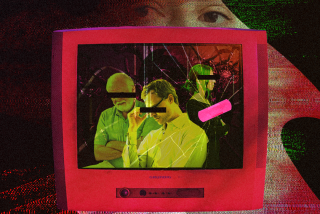Privilege makes them do it — what a study of Internet trolls reveals
- Share via
The British government just put up a website with advice on how to fight back against Internet trolls. Popular Science magazine decided “trolls and spambots” were shouting down scientific debate; Christianity Today also ended online comments on its news and features, and the news service Reuters pulled the plug on its comment page for news stories. Humans have said and written nasty things about each other ever since there were humans; has the Internet changed anything? Whitney Phillips is a lecturer in communications at Humboldt State University and a media studies scholar. Her troll research, in a new book, “This Is Why We Can’t Have Nice Things,” asks the same thing. Her conclusion? “N2M” — not too much.
You contend that trolls don’t break new ground.
The assumption is that trolling is this aberrant thing; that trolls are sociopaths. But what makes them important culturally is not the ways in which they’re aberrant but the points of overlap between trolling and behaviors in day-to-day life. Trolls are criticized for this antagonistic rhetorical style that’s present in politics, in academia, in other spheres of culture, but trolling behaviors are the ones condemned as aberrant.
Trolls’ strategies for getting attention are similar to the strategies employed by sensationalist media outlets that can include blogs, Buzzfeed, the Daily Mail — the Daily Troll, as it’s referred to — that deliberately try to get people to click on stories: knee-jerk, sensationalist, exploitative coverage of often tragic stories.
Trolls aren’t inventing anything. Every single trope they engage with exists in real life offline; [they are] just picking up cultural detritus and weaponizing stuff that’s already on the ground.
Then the difference is the technology — the medium, not the message?
The Internet is functioning as the amplifier for all kinds of expression, good, bad and indifferent. Then you have the collapse of public versus private; the Internet allows for many more kinds of expression to be visible.
What’s the troll spectrum?
You have trolls engaging in, essentially, mischief, being playful and silly, all the way to tormenting the friends and family of young people who have killed themselves. The same troll can engage in all the permutations of trolling.
Businesses get clicks that translate into money. What do trolls get out of trolling?
Trolls claim that they are motivated solely by “lulz,” which is a corruption of “laugh out loud” — antagonistic laughter indicating the target has responded with strong negative emotion. Someone gets very angry, very sad, very scared — that’s what trolls say they’re after. The most problematic cases I describe, it’s just about making somebody you don’t know cry.
When I was “sitting down” with trolls on Skype or Facebook, I would ask, “What motivates you?” If they agreed to answer the question, there was a high likelihood they were trolling me. I can’t count the times an interviewee responded with some horrifying [personal] story about childhood abuse and depression and would just turn around and LOL JK me — ha ha, I’m just kidding, you’re an idiot. You can’t be sure you’re getting a straight answer.
It’s hard to get demographics on who trolls are, but you note that their targets are usually women, people of color and LGBT people, and sometimes Christians and Republicans.
They’re asserting power and privilege in an unmistakable pattern: They’re policing against female-gendered behaviors — anything regarded by them as soft or emotional or sentimental. The idea of “raping with logic” comes up again and again. That’s how they understand and celebrate their behavior.
Trolling is gendered male. With race, there’s this presumption that everyone [trolling] is white, and anyone who deviates from that has to flag themselves. And this is leisure activity. Only a certain kind of person is going to have the time or energy to devote to something that doesn’t get them anything other than enjoyment and interest.
Sick jokes and laughing at others’ pain have been around far longer than the Internet, but trolls also mock the dead and their mourners.
The primary question I get is, “What’s wrong with them?” That sidesteps the ways in which trolling necessitates the trolling mask. Instead of thinking about [a tragedy] as a totality, they think about individual, tiny, fetishized details. If a young person was killed in a particular way and there was an “amusing” detail about the death, they would focus on that. They’re not thinking about the person who died and the people affected by that death. It’s not that they’re laughing necessarily at other people’s pain. They’re in a privileged position where they don’t need to think about it.
What if it happens to them?
The second that boundary collapses, the troll stops trolling. Paulie Socash, one of the research subjects I worked with, had [an acquaintance] die, and he was suddenly responding as a human and not as a troll; he had an emotional connection. He said he was going to monitor the [memorial] page of the person who had died, and if any trolling appeared, he’d send the administrator of the page some troll-fighting tips. But then, in this return to his trollish register, he said that’s what [the administrator] should have done in the first place. It was the ultimate return of the trolling persona, being judgmental.
Some argue the shield of anonymity should be removed.
I’m ambivalent about anonymity. It can be harnessed for really destructive ends but also for positive, empowering ends, particularly for populations who aren’t safe expressing certain attitudes, [such as] queer youth. I encounter people who assume if you take away anonymity, trolling would disappear, but that’s not true. Some of the most dangerous people out there are perfectly happy expressing hate and violence in their own names. Anonymity isn’t the culprit; it’s just the backdrop.
Australia has an anti-trolling law, but it’s hard to legislate in the U.S.
American trolls wrap themselves in the American flag like nobody I’ve seen. They consider themselves patriots as far as the Constitution goes. There’s a sense that if we can, we should. That’s still the narrative of America. Trolls are taking [a] much-lauded American ideal and turning it into this grotesque satire of itself.
When someone takes offense, the common retort is “Can’t you take a joke?”
If you call someone out, the [response] is, “I was just trolling.” To me, that’s a cop-out. People need to take responsibility for hateful speech and behavior. If in their heart of hearts they are feminist and anti-racist and pro-gay rights, and they say horrifying and hateful things online, they may not mean it, but that doesn’t matter. What matters is what other people take from it. A person of color or a woman or queer person who constantly has to encounter racist, sexist, homophobic language online — that affects them.
[Trolling] gives people the false sense that they are not ultimately responsible for what they say. It’s not surprising that if you push back, [some] people get embarrassed or apologize. Then there are other types who, when you push back, just get angrier. We saw that with Gamergate [in 2014, women commenting on sexism in the video-game business were harassed in an online campaign that included threats of rape and death]. Women were standing up for themselves and then you had this swarm just looking for an excuse to go after a woman; the worst kind of bigotry. That’s not trolling; that’s violent misogyny.
Where does trolling go from here?
How it evolves is intimately tethered to cultural conversations about feminism and gay rights and a pushback against systemic racism. Seeing what happened in Charleston, I can’t be too optimistic about the idea that trolls are going to go away because everybody will suddenly get along, but by God, I wish that would happen.
This interview has been edited and condensed.
Twitter: @pattmlatimes
Follow the Opinion section on Twitter @latimesopinion and Facebook
More to Read
A cure for the common opinion
Get thought-provoking perspectives with our weekly newsletter.
You may occasionally receive promotional content from the Los Angeles Times.










